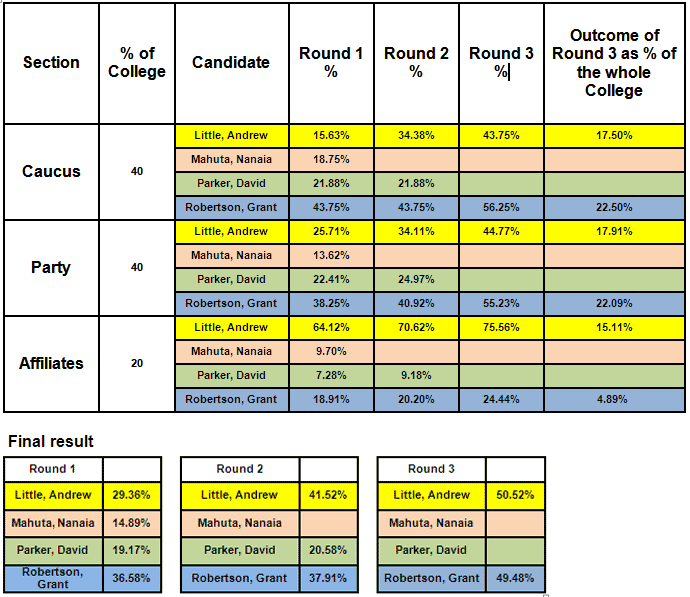The only thing worse than electing the wrong person as leader of Labour is electing him by the narrowest of margins, by virtue of the influence of a handful of individuals acting under instructions.
Labour just made the wrong choice, in the worst possible way.
Obviously, I think that the decision to choose Andrew Little over Grant Robertson was the wrong one however it came about … that's because Grant is a good friend whom I think will one day make a fantastic Prime Minister of New Zealand. So Andrew Little could be the reincarnation of Jack Kennedy mixed with Bob Hawke by way of Michael Joseph Savage (which he most certainly isn't) and I'd still be lamenting the Labour Party's decision to appoint him leader ahead of Grant.
So let's put aside my personal disappointment at the actual decision that Labour has made and instead look at how it has done so. Because it looks to me like it's created an almighty cluster&*k.
Here is the breakdown of the various rounds of the vote (courtesy of the NZ Herald).

Notice two things about these results.
First, Little beat Grant by just over 1% of the weighted votes cast. That's about as close a margin of victory as you can get, achieved on the third round. So the overall mandate for Little's leadership is … fragile, at best.
Second, Little lost heavily to Grant in both the Caucus and the Membership vote in every successive round of voting. Little was the first choice to be leader of only four of his colleagues (assuming he voted for himself, that is). Only 14 of 32 backed him as leader over Grant by their third choice - meaning 18 of 32 think Grant is a better person to lead them. And in respect of the membership vote, Little was consistently 10% behind Grant at each stage of the vote.
The thing that gave Little the edge, of course, was his support amongst "affiliates" - which means those unions that still retain membership ties with Labour.
Now, I'm not a knee-jerk anti-union person. I am, and always have been, a member of AUS and then the TEU. I served on the local branch committee for a while. I believe strongly in the need for collective organisation and action to protect the rights and interests of working people.
I also accept that the Labour Party has been (and to a degree remains) the political expression of that need. So I don't have any sort of problem in principle with the union movement having some sort of guaranteed input into the process of selecting the leader of the Party. Plus, of course, its really only the Labour Party's business how they do things.
But for all that, as a "concerned observer", I think that the sight of the Labour Party leader being chosen almost purely because of lopsided support amongst the union organisations is a terrible, terrible one for it. Especially when you break down what that "support" actually means in practice. It's not that 75% of the individual members of all the affiliated unions think Little is a better leader than Grant. It's instead that 75% of those people that each union allowed to decide the issue plumped for Little ahead of Grant. People who, in the case of (say) the Engineering, Printing and Manufacturing Union, basically were told by their leaders that they should vote for the guy who used to be their boss.
And so Little is going to come into this role without the backing of a majority of either the MPs he has to lead, or the individual party members who are meant to do the work for the party, but rather because of the union hierarchies' blessing.
Now, I may be completely wrong here (as I have been so often in the past), but this strikes me as a pretty weak foundation from which to rebuild the party in the public's eye. If you thought Grant's perceived urban-liberal-career-politician persona was a millstone, wait until you see what happens with Little's union-boss-put-there-by-his-cronies.
So - I'm sorry for Grant. But I'm almost sorrier for Labour. Because this result has settled who will lead it, in the worst way possible.
Update: In my haste to post, I forgot that I meant to draw readers' attention to this analogy. In 2010, Ed Miliband won the leadership of the UK Labour Party in almost exactly the same way that Little did (losing both the caucus and the membership vote, but winning the union vote handily).
